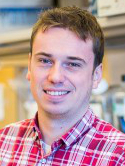Tumor microenvironment-derived NRG1 promotes antiandrogen resistance in prostate cancer Journal Article
| Authors: | Zhang, Z.; Karthaus, W. R.; Lee, Y. S.; Gao, V. R.; Wu, C.; Russo, J. W.; Liu, M.; Mota, J. M.; Abida, W.; Linton, E.; Lee, E.; Barnes, S. D.; Chen, H. A.; Mao, N.; Wongvipat, J.; Choi, D.; Chen, X.; Zhao, H.; Manova-Todorova, K.; de Stanchina, E.; Taplin, M. E.; Balk, S. P.; Rathkopf, D. E.; Gopalan, A.; Carver, B. S.; Mu, P.; Jiang, X.; Watson, P. A.; Sawyers, C. L. |
| Article Title: | Tumor microenvironment-derived NRG1 promotes antiandrogen resistance in prostate cancer |
| Abstract: | Despite the development of second-generation antiandrogens, acquired resistance to hormone therapy remains a major challenge in treating advanced prostate cancer. We find that cancer-associated fibroblasts (CAFs) can promote antiandrogen resistance in mouse models and in prostate organoid cultures. We identify neuregulin 1 (NRG1) in CAF supernatant, which promotes resistance in tumor cells through activation of HER3. Pharmacological blockade of the NRG1/HER3 axis using clinical-grade blocking antibodies re-sensitizes tumors to hormone deprivation in vitro and in vivo. Furthermore, patients with castration-resistant prostate cancer with increased tumor NRG1 activity have an inferior response to second-generation antiandrogen therapy. This work reveals a paracrine mechanism of antiandrogen resistance in prostate cancer amenable to clinical testing using available targeted therapies. © 2020 The Authors Zhang et al. find that cancer-associated fibroblasts promote antiandrogen resistance in prostate cancer by secreting NRG1 to activate HER3 signaling in prostate cancer cells. Blockade of the NRG1/HER3 axis can re-sensitize prostate cancer models to antiandrogen therapy. © 2020 The Authors |
| Keywords: | controlled study; protein phosphorylation; treatment outcome; human cell; nonhuman; comparative study; follow up; mouse; gene expression; protein targeting; animal experiment; animal model; drug resistance; protein tyrosine kinase; phosphatidylinositol 3 kinase; cancer resistance; prostate cancer; gleason score; alpha smooth muscle actin; mammalian target of rapamycin; androgen deprivation therapy; hormone therapy; vimentin; tumor microenvironment; abiraterone; cancer associated fibroblast; neu differentiation factor; enzalutamide; antiandrogen therapy; cancer-associated fibroblast; human; male; priority journal; article; lncap cell line; nrg1/neuregulin 1 |
| Journal Title: | Cancer Cell |
| Volume: | 38 |
| Issue: | 2 |
| ISSN: | 1535-6108 |
| Publisher: | Cell Press |
| Date Published: | 2020-08-10 |
| Start Page: | 279 |
| End Page: | 296.e9 |
| Language: | English |
| DOI: | 10.1016/j.ccell.2020.06.005 |
| PUBMED: | 32679108 |
| PROVIDER: | scopus |
| PMCID: | PMC7472556 |
| DOI/URL: | |
| Notes: | Article -- Export Date: 1 September 2020 -- Source: Scopus |
Altmetric
Citation Impact
BMJ Impact Analytics
MSK Authors
Related MSK Work

























